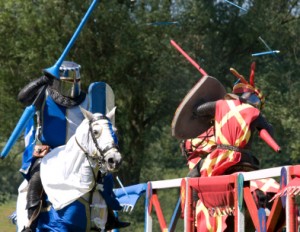 On this day in history, 24th January 1536, the forty-four year-old Henry VIII suffered a serious jousting accident at Greenwich Palace.
On this day in history, 24th January 1536, the forty-four year-old Henry VIII suffered a serious jousting accident at Greenwich Palace.
The Imperial ambassador, Eustace Chapuys, reported:
“On the eve of the Conversion of St. Paul, the King being mounted on a great horse to run at the lists, both fell so heavily that every one thought it a miracle he was not killed, but he sustained no injury. Thinks he might ask of fortune for what greater misfortune he is reserved, like the other tyrant who escaped from the fall of the house, in which all the rest were smothered, and soon after died.”1
And Dr Ortiz, in his letter to the Empress, wrote:
“The French king said that the king of England had fallen from his horse, and been for two hours without speaking. “La Ana” was so upset that she miscarried of a son.”2
You can read more about the accident and its impact in my article Henry VIII’s Jousting Accident – 24th January 1536
Henry VIII’s 1536 jousting accident is one of the events on my countdown to Anne’s fall on The Fall of Anne Boleyn: A Countdown website – see www.thefallofanneboleyn.com for the list of dates and events.
Notes and Sources
- LP x.200, Chapuys to Granvelle
- LP x.427, Dr Ortiz to the Empress
Some people say that it would be better if he had died and I agree – after all, he killed so many people – a life for hundreds of lives? I’m also surprised nobody tried to kill him – people tried to kill Queen Victoria and she did no harm
agree with above
An experience close to death could change a person. Especially in the case of henry. Lets not forget that the joust was meant to celebrate the death of Catherine of Aragon and its result was that henry almost died and lost his child, possibly a son he fought for all those years. I know it’s crazy but we need to take his perspective and it’s not too hard for we to see the point he got from those events. He had been punished for catherine’s death and someone instead of him should take the sin.
What a troublesome man ! Poor Anne… always suffering. I believe that all this miscariages in part happened because of her nerves. Can you imagine a marriage with this kind of bipolar man?!
According to Alison Weir in Mary Boleyn (p72, hardcover), the part about Henry being unconscious for 2 hours was made up by Rodolfo Pio, the Papal Nuncio in Paris (and likely the source of the French king’s info if so), and not reported by any observer actually in England at the time. Now, Ms Weir is not one of my favorite historians, but I’m rather curious since I’m working on a project in which Henry’s accident & coma are VERY important. Have you heard this? Is it believable? (won’t affect my project either way, since the accident is the major turning point, not the coma)
I’ve just checked Weir’s reference for that and she cites “Bagley”, which is J. J. Bagley’s “Henry VIII and His Times” (1962). I don’t have a copy of this book so I can’t say what Bagley says about it or what he cites, so it’s hard to answer your question. The only evidence for Henry VIII being unconscious for two hours is Dr Ortiz’ letter to the Empress of Hungary and he says that the Imperial ambassador told Francis I that Henry VIII had been “two hours unconscious without speech” (Calendar of State Papers, Spain, 1536-1538, p67). Now, Pio was the Papal Nuncio and not the Imperial ambassador, so it is hard to know who Ortiz is referring to.
There are a couple of other sources for the King’s accident:
Wriothesley downplays the accident and the other chroniclers don’t mention it but perhaps the King wanted it downplayed. He wouldn’t want people to think that he was ill or weak. Although Chapuys says “he sustained no injury”, he does comment that he fell “so heavily that every one thought it a miracle he was not killed.” It really is impossible to know what happened and who to believe. I have ordered Bagley’s book and will let you know if Bagley cites another source to back up the idea that it stems from Pio. Weir’s references are terrible, she doesn’t give a page number so it might take me a while when I actually get the book!